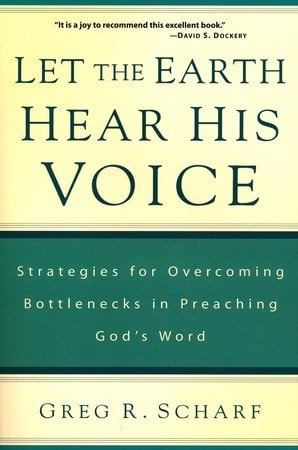⏱️ Estimated Reading Time: 4 min read
Pastors, Bible study leaders, and all who preach and teach the Word of God have a challenging and humbling responsibility in teaching the Word of God to the people of God. This requires great skill, maturity, training, and practice. Let The Earth Hear His Voice Strategies for Overcoming Bottlenecks in Preaching God’s Word by Greg Scharf was written to help provide pastors, preachers, and ministry leaders overcome issues that affect their ability to be fruitful in ministry.
In chapter one, the author gives us a biblical-theological rationale for preaching. Here the author walks his readers through what the Bible teaches from Genesis to Revelation about preaching. Then he asks an important question which is the focus of this book, “Why is my preaching not powerful?” Here he notes, “Why, then, does God’s Word not consistently do what he designed it to do when we preach it? The rest of this book is dedicated to answering this question. There are, frankly, bottlenecks that constrict the flow of God’s Word from him to those who receive it” (31). He also explains that:
“Faithfulness to God in preaching means accurately relaying to our listeners the content, emphasis, tone, and aim of biblical texts understood in their context. Our task is not to embellish the treasure, supplant it, or neglect it. Our task is to convey it without tampering with it in any way. Faithfulness is multifaceted; there is much more to it than simply capturing the dominating thrust of the passage we are expounding, essential as that is” (31).
He goes on to list eight ways that faithful servants of God’s Word prove themselves to be faithful stewards when they trust God, speak as those assigned, equipped, and empowered to do so, and to speak from the Bible in ways that reflect the Bible’s composition. Along with this, the author encourages teachers of the Word to listen to God before they attempt to speak for God, discern what He is saying, understand those whom God has called them to speak, respect and reflect the clarity, and orderliness of Scripture. In addition, to this vital teaching the author helps us hear, respect and reflect the ways that Scripture communicates in stories, propositions, and images, and finally to take seriously our role as messengers of the gospel (31-32).
Chapters three through ten explore what the author calls “bottlenecks”. These eight bottlenecks are little faith (chapter three), the unqualified or disqualified preacher (chapter four), faulty text selection (chapter five), inadequate understanding of the preaching passage (chapter six), inadequate contextualization to the preaching situation (chapter seven), faulty organization (chapter eight), inadequate or overused illustration (chapter nine), and flawed delivery (chapter ten). The book concludes with two appendixes looking at supplemental biblical texts that relate to preaching, and a cross-referencing of this book with Dr. Bryan Chapell’s Christ-Centered Preaching.
The author has a number of suggestions for improving our craft such as taking care of your voice, using your voice well, practice reading the text of Scripture, mastering your material, trying to reduce your sermon to notes instead of using the whole manuscript (if you can), find your own style of preaching, invite the Holy Spirit to speak through you as you preach His Word, and welcome and solicit feedback (206-212).
This book is full of reminders on the fundamentals of preaching. This would be a great book for Bible College and seminary students to read and digest as it will help them become men of character who take seriously the charge to preach the Word. I recommend this book for new or seasoned pastors and believe reading it will help them to continue to grow in Christ and in their craft.
I received this book for free from P&R for this review. I was not required to write a positive review. The opinions I have expressed are my own. I am disclosing this in accordance with the Federal Trade Commission’s 16 CFR, Part 255: “Guides Concerning the Use of Endorsements and Testimonials in Advertising.”




